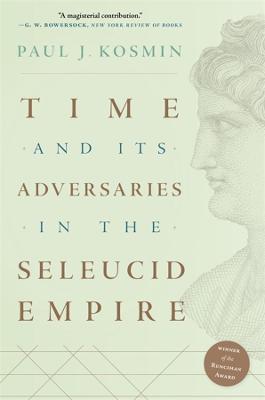Time and Its Adversaries in the Seleucid Empire

Time and Its Adversaries in the Seleucid Empire
Winner of the Runciman Award
Winner of the Charles J. Goodwin Award
--Harper's In the aftermath of Alexander the Great's conquests, his successors, the Seleucid kings, ruled a vast territory stretching from Central Asia and Anatolia to the Persian Gulf. In 305 BCE, in a radical move to impose unity and regulate behavior, Seleucus I introduced a linear conception of time. Time would no longer restart with each new monarch. Instead, progressively numbered years--continuous and irreversible--became the de facto measure of historical duration. This new temporality, propagated throughout the empire and identical to the system we use today, changed how people did business, recorded events, and oriented themselves to the larger world. Some rebellious subjects, eager to resurrect their pre-Hellenic past, rejected this new approach and created apocalyptic time frames, predicting the total end of history. In this magisterial work, Paul Kosmin shows how the Seleucid Empire's invention of a new kind of time--and the rebellions against this worldview--had far reaching political and religious consequences, transforming the way we organize our thoughts about the past, present, and future. "Without Paul Kosmin's meticulous investigation of what Seleucus achieved in creating his calendar without end we would never have been able to comprehend the traces of it that appear in late antiquity...A magisterial contribution to this hitherto obscure but clearly important restructuring of time in the ancient Mediterranean world."
--G. W. Bowersock, New York Review of Books "With erudition, theoretical sophistication, and meticulous discussion of the sources, Paul Kosmin sheds new light on the meaning of time, memory, and identity in a multicultural setting."
--Angelos Chaniotis, author of Age of Conquests
216.68Lei
216.68Lei
Livrare in 2-4 saptamani
Descrierea produsului
Winner of the Runciman Award
Winner of the Charles J. Goodwin Award
--Harper's In the aftermath of Alexander the Great's conquests, his successors, the Seleucid kings, ruled a vast territory stretching from Central Asia and Anatolia to the Persian Gulf. In 305 BCE, in a radical move to impose unity and regulate behavior, Seleucus I introduced a linear conception of time. Time would no longer restart with each new monarch. Instead, progressively numbered years--continuous and irreversible--became the de facto measure of historical duration. This new temporality, propagated throughout the empire and identical to the system we use today, changed how people did business, recorded events, and oriented themselves to the larger world. Some rebellious subjects, eager to resurrect their pre-Hellenic past, rejected this new approach and created apocalyptic time frames, predicting the total end of history. In this magisterial work, Paul Kosmin shows how the Seleucid Empire's invention of a new kind of time--and the rebellions against this worldview--had far reaching political and religious consequences, transforming the way we organize our thoughts about the past, present, and future. "Without Paul Kosmin's meticulous investigation of what Seleucus achieved in creating his calendar without end we would never have been able to comprehend the traces of it that appear in late antiquity...A magisterial contribution to this hitherto obscure but clearly important restructuring of time in the ancient Mediterranean world."
--G. W. Bowersock, New York Review of Books "With erudition, theoretical sophistication, and meticulous discussion of the sources, Paul Kosmin sheds new light on the meaning of time, memory, and identity in a multicultural setting."
--Angelos Chaniotis, author of Age of Conquests
Detaliile produsului










